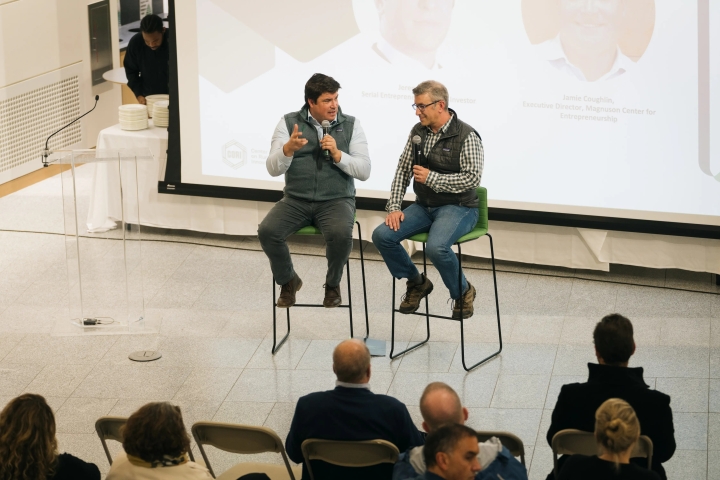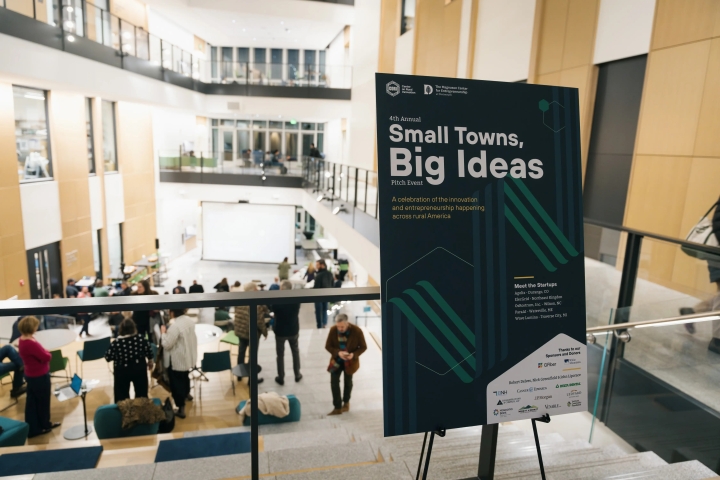On November 13, five startups from around the country competed for a $10,000 prize in the fourth annual Small Towns, Big Ideas—a unique platform for rural tech entrepreneurs to network and pitch their ideas to leading rural entrepreneurs, venture capitalists, investors, and advocates for rural economic development.
Held at the Class of 1982 Engineering and Computer Science Center and over livestream, the event was hosted by the Magnuson Center for Entrepreneurship in collaboration with the Hartland, Vt.-based Center on Rural Innovation, and drew a total of more than 300 attendees.
The keynote was a fireside chat with Magnuson Center Executive Director Jamie Coughlin and Jeremy Katz ’95, a serial entrepreneur and leader in rural innovation who is an inaugural member of the Magnuson Center Board of Advisors. Katz is the founder of the Claremont, N.H., MakerSpace and has spent over two decades building, funding, and advising more than six dozen startups, with a focus on fostering creativity and technological advancement in rural areas.

The pitch competition featured five teams from around the country, each showcasing a different facet of rural tech innovation. The winner of the $10,000 prize was Wilson, N.C.-based OsRostrum, which offers an affordable mobile platform for farmers to track structural traits and develop data-driven breeding strategies that improve cow health and longevity, bridging the gap between technology and agricultural productivity.
“OsRostrum stood out for their innovative approach to precision agriculture through a cost-effective mobile platform that addresses the challenges faced by farmers in improving livestock health and breeding outcomes,” Coughlin says. “By combining technology with practical agricultural needs, OsRostrum exemplifies the spirit of Small Towns, Big Ideas—leveraging technology to solve real-world problems in rural areas.”
“Winning Small Towns, Big Ideas is a huge honor for our team,” says Catie McVey, OsRostrum’s founder. “At OsRostrum, we’re passionate about helping farmers improve livestock health and make more data-driven decisions, and this prize will allow us to expand our platform to reach even more of the rural community. We’re grateful for the support from the Magnuson Center and the connections we’ve made through this event.”
In addition to OsRostrum, the competing teams included:
- Agolix (Durango, Colo.): Providing an accessible platform for consultants, coaches, and small businesses to create custom assessments with automated reporting options, Agolix is supporting service providers with streamlined, tech-enabled tools.
- ElecGrid (Newport, Vt.): Focused on the critical need for rapid response in the utilities sector, ElecGrid’s incident response and recovery software helps utilities coordinate work efficiently in the field, ensuring faster relief efforts.
- ParaAi (Waterville, Maine): Integrating cutting-edge AI technology, ParaAi’s Quill software provides a comprehensive virtual assistant that supports various aspects of the writing process, enhancing productivity for writers and content creators alike.
- Wave Lumina (Traverse City, Mich.): Dedicated to environmental sustainability, Wave Lumina provides tools for rapid detection of pollutants in natural resources, aiding in environmental remediation efforts essential to preserving natural habitats.
The Magnuson Center is committed to the importance of fostering innovation and entrepreneurship across all regions, particularly in rural communities where ingenuity often thrives in unique ways, says Coughlin. Initiatives like Small Towns, Big Ideas are designed to encourage networking, collaboration, and create opportunities for connections far beyond the event itself.
“Rural innovation is often overlooked, but at the Magnuson Center, we know that some of the most groundbreaking ideas come from places outside traditional technology hubs. Events like Small Towns, Big Ideas are crucial for bringing these voices to the forefront,” Coughlin says.“We’re honored to host and champion these inspiring entrepreneurs, whose passion and resilience exemplify the best of rural innovation. By amplifying these voices and supporting rural startups, we are paving the way for a future where all communities, regardless of size, can access the opportunities, connections, and resources necessary to drive economic growth and technological advancement.”


